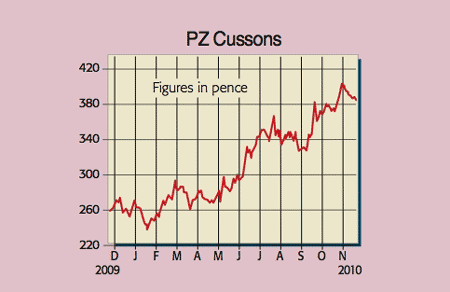
Before buying a stock, it is absolutely vital to assess its risk and reward profile. Seat-of-the-pants traders would disagree and ‘ride the tide’. But this testosterone-driven mentality is one of the main reasons why bubbles occur. It has been partly responsible for unprecedented sums of money rushing into emerging markets. The upshot is that many frontier nations are priced to perfection. Indeed, if one looks at through-cycle profit margins, then emerging markets are trading on adjusted p/e ratios of 20 plus. The Shanghai Composite is bumping along on a trailing p/e of 50. This is madness. It affords no leeway for the elevated geopolitical and currency risks.
Only last week China said it would introduce tough price controls to reduce inflation. That will hit corporate profitability. Emerging-market history is littered with cases of asset confiscation and civil unrest. Many of the same dangers now stalk companies that are listed in London, but have large overseas exposures.
Take PZ Cussons, the maker of Imperial Leather soap, Carex handwash, Morning Fresh washing-up liquid and St Tropez fake tan mousses. About 42% of its turnover is derived from Africa, with another 21% coming from Asia. What’s more, its biggest single territory is Nigeria, which is notoriously blighted by corruption and government instability. True, Cussons understands these countries well, but investors should factor in the possibility of disruption. Just ask Shell. It has been battling for years with attacks on staff, pipelines, oil fields and similar infrastructure. And it has only carried on operating in Nigeria because of the size of its natural resources. But in light of the government bringing in harsher terms for foreign companies and giving greater control of the oil industry to domestic operators, it is in the process of offloading many of its assets in the poverty and violence-ridden Niger Delta.
Elsewhere, the outlook for Cussons isn’t too rosy either. In Europe, for the year ending May 2010, revenues fell by 3% to £281m as the effects of price discounting outweighed the benefits of product launches. Indeed, the financial director, Brandon Leigh, said that shrinking disposable incomes were making consumers “quite discerning”, especially in countries such as Greece and Britain. He added: “There’s acceptance that our basic shower gel and handwash will be on promotion at £1 for quite a time.”
PZ Cussons (LSE: PZC), rated a BUY by Shore Capital
That’s obviously good news for supermarket discount brands made by the likes of McBride. But it’s much less so for luxury items such as St Tropez. Prices can be as steep as £20 for a 120ml container. Don’t get me wrong – Cussons is not in big trouble. My concern surrounds its frothy valuation – the stock trades on a bubbly 23 times 2010 earnings per share (while offering only a 2% yield).
This represents a 40% premium to much larger rivals Unilever and Reckitt. They trade on p/e ratios of 15-16, and offer much fatter dividends. All told, I would rate Cussons on a ten times 2010 earnings before interest, tax and amortisation (EBITA) multiple. After adjusting for the proforma £60m of net cash, that delivers an intrinsic worth of about 280p per share. The next trading update is scheduled for 9 December.
Recommendation: SELL at 375p